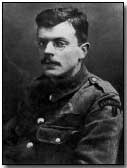Prose & Poetry - Ivor Gurney
 The Gloucestershire poet and composer
Ivor Gurney (1890-1937) was born on 28 August 1890 and educated as a chorister at King's
School, Gloucester, where he won a scholarship to the Royal College of
Music. Gurney wrote both poetry and music from an early age, 14.
The Gloucestershire poet and composer
Ivor Gurney (1890-1937) was born on 28 August 1890 and educated as a chorister at King's
School, Gloucester, where he won a scholarship to the Royal College of
Music. Gurney wrote both poetry and music from an early age, 14.
At the outbreak of the war he volunteered as a private for the Gloucester Regiment, although he was initially rejected on account of poor eyesight; he finally succeeded in joining the 2nd and 5th Gloucestershire Regiment in 1915.
First wounded in April and then gassed in September 1917 whilst serving in France, Gurney was sent home.
In 1917 his successful collection Severn and Somme went into a second edition. He continued to write music however, whilst occupied in a variety of jobs. War's Embers was published in 1919, with To His Love being published in this latter collection.
Always highly sensitive and moody, Gurney had developed signs of serious mental disturbance by 1918, although his mental condition was already strained by 1912. He was subsequently committed by his family to a Gloucester asylum in 1922 and later transferred to Dartford.
He never subsequently left hospital, although the popular myth that he continued to relive the war was not in fact true: he himself admitted lying - claiming he had suffered from shell shock - simply in order to gain a better pension.
Ivor Gurney, who never married, died on 26 December 1937 at the City of London mental hospital. During his life he had written hundreds of poems as well as approximately 300 songs in addition to instrumental music.
While his reputation during his own lifetime was primarily based around the quality of his music, his poetical talents have subsequently gained recognition (and were championed by Edmund Blunden).
The Silent One
Who died on the wires, and hung there, one of two -
Who for his hours of life had chattered through
Infinite lovely chatter of Bucks accent:
Yet faced unbroken wires; stepped over, and went
A noble fool, faithful to his stripes - and ended.
But I weak, hungry, and willing only for the chance
Of line - to fight in the line, lay down under unbroken
Wires, and saw the flashes and kept unshaken,
Till the politest voice - a finicking accent, said:
"Do you think you might crawl through, there: there's a hole"
Darkness, shot at: I smiled, as politely replied -
"I'm afraid not, Sir." There was no hole no way to be seen
Nothing but chance of death, after tearing of clothes
Kept flat, and watched the darkness, hearing bullets whizzing -
And thought of music - and swore deep heart's deep oaths
(Polite to God) and retreated and came on again,
Again retreated - and a second time faced the screen.
The Austro-Hungarian declaration of war was the first ever delivered by telegram.
- Did you know?
